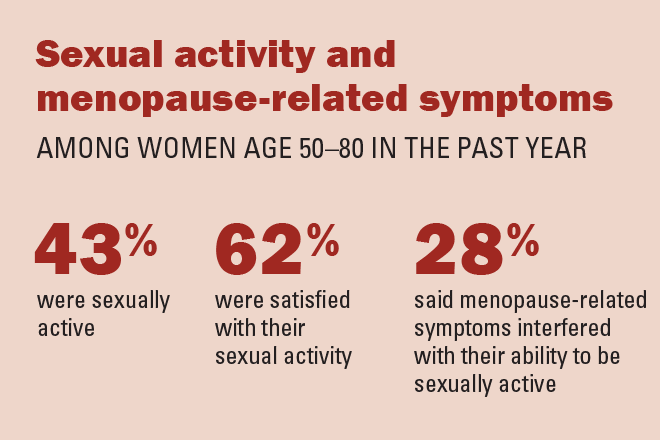
More than half of the women between age 50 and 64 reported being sexually active but nearly a third said menopause symptoms interfered, according to a poll conducted by the University of Michigan’s National Poll on Healthy Aging.
Despite these and other menopause-related symptoms, only 44 percent of the respondents said they discussed treatment alternatives with their provider. The vast majority (88 percent) of those who did discuss it said they felt their symptoms were managed somewhat or very well.
“Women over 50 who experience menopause symptoms or other health concerns that interfere with sexual activity should absolutely speak up to their health care providers and find out what their options might be,” said Daniel Morgan, M.D., a professor of obstetrics and gynecology at Michigan Medicine who worked on the report. “Often women and their partners overlook the intertwined nature of physical and mental health, and sexual health and the ways menopause-related symptoms can have an impact on sexual activity. It’s important to understand what your treatment options are, and which ones might be appropriate for your needs and goals.”
Sex and menopause after 50
Among women 50-80, 43 percent reported being sexually active in the past year, which the poll identified as caressing, foreplay, masturbation or intercourse, and 62 percent of them reported being satisfied with their sexual activity. While the survey found reported menopause symptoms were more common among those ages 50-64, many older women also reported symptoms. (Women younger than 50 may also report experiencing menopause-type symptoms.)
Among the same cohort, 84 percent reported experiencing menopause-type symptoms in the previous year. More than half said they had sleep problems (56 percent) or weight gain (55 percent) with slightly less than half reporting reduced sexual desire (48 percent), hot flashes or night sweats (41 percent) and mood swings (38 percent).
Nearly a third said these symptoms interfered with their daily life and 28 percent said they affected their ability to be sexually active.
Many don’t talk to their healthcare provider
More than half of those surveyed (54 percent) said they discussed their menopause symptoms with a healthcare provider and of those, 64 percent received treatment. A third of them felt their symptoms were managed very well, 55 percent somewhat well and 12 percent not very well or at all.
“We’ve found in previous AARP research that women don’t know as much as they should about the conditions leading up to menopause and healthcare providers are not proactive in initiating the conversation about this life transition,” said Teresa A. Keenan, Ph.D., Director of Health Security Research, AARP Research. “As this new report notes, it’s important for women to feel empowered to take control of their own health and to initiate discussions with their health care provider, including discussions around sex and intimacy, to contemplate potential treatment options. With many years of post-menopausal life ahead, their concerns are too important to ignore.”
Take our survey on sleep and menopause
The contents of this feature are not provided or reviewed by NPWH.

